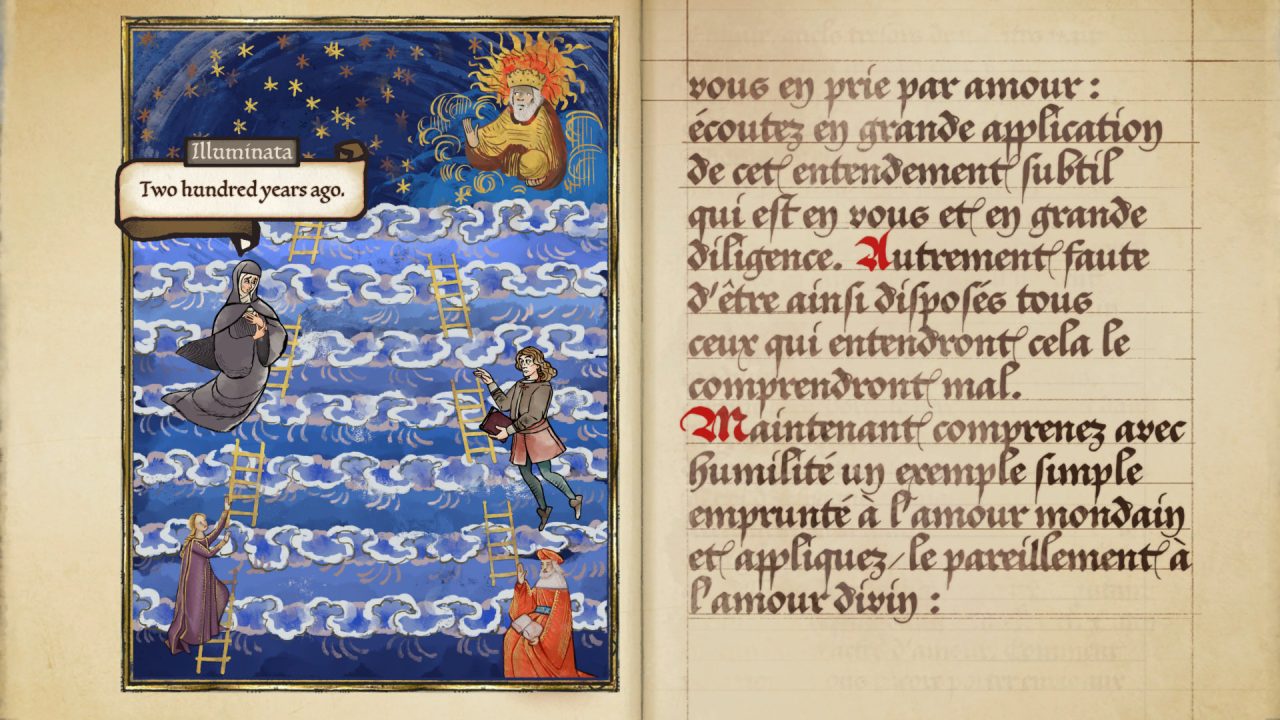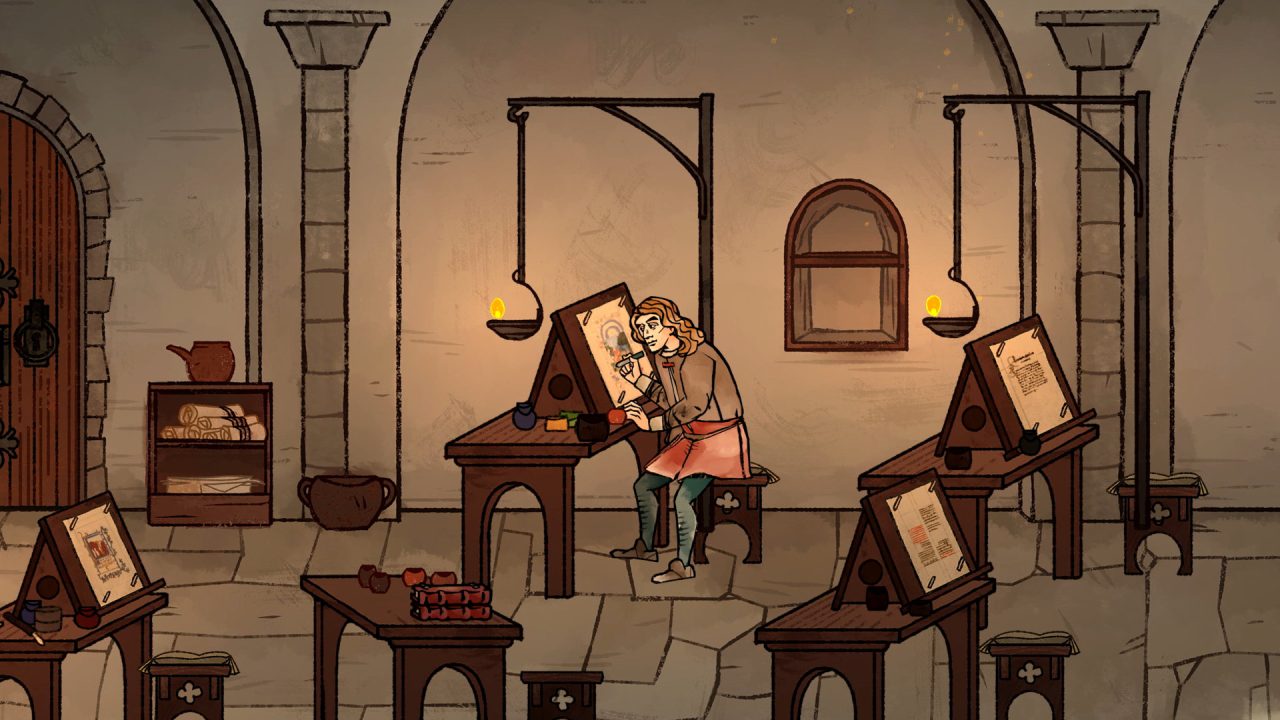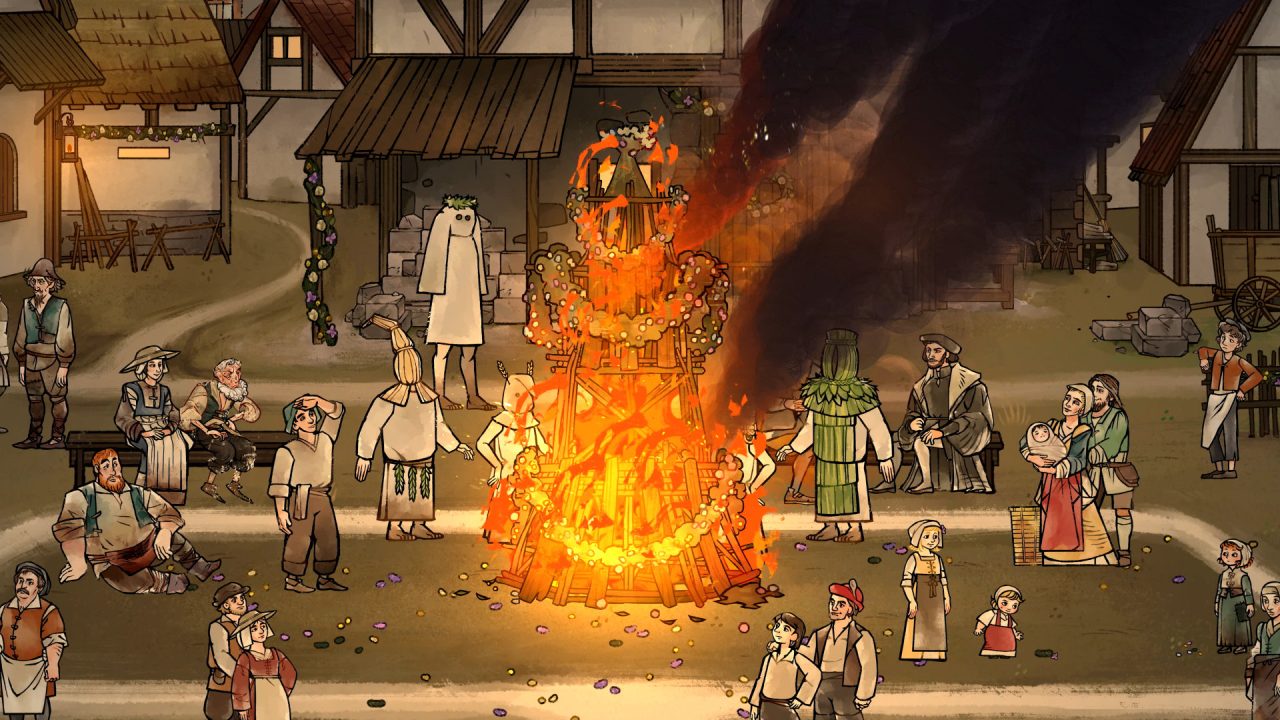A pentiment is defined as: “an underlying image in a painting, especially one that has become visible when the top layer of paint has turned transparent with age, providing evidence of revision by the artist.” With one word, I’m hooked. What a phenomenal premise for an adventure title. And I don’t even know what Pentiment’s about.
Enter Andreas Maler, a budding artist working on his masterpiece in a small European village up in the Bavarian Alps during the 16th century. Working at the abbey that oversees the village, Andreas uses his talents as an artist to fulfill commissions for the scriptorium while finishing his masterpiece on the side. Being a guest to both the abbey and Tassing (the village), players enjoy the tried-and-true luxury of not having any history with the denizens, looking on as if a blank slate and making up their own minds along with Andreas. Of course, life isn’t so simple for Andreas, as a murder befalls this otherwise peaceful and tame village.
As an amateur investigator, Andreas uses his friendly yet loose relationships with the inhabitants who respect him as a learned man to gather clues and finger the one whodunnit. The narrative becomes even more complex as Andreas realizes there may be more behind this murder than a crime of passion; ornate, mysterious notes are discovered that suggest someone else may be working behind the scenes. Or perhaps it’s a ghost.

Pentiment proceeds like this, with Andreas building relationships with inhabitants players decide to cozy up to, sharing meals or chores. After all, life must go on even while a murderer is on the loose. As the game continues, players begin to realize tensions between the abbey and Tassing are growing as the abbot’s taxes become increasingly oppressive. Time marches on, and we see Tassing and the abbey develop over the years.
And while I may be tempted to elaborate further because I absolutely love this storytelling, I must stop for fear of spoilers. Yet, I must also make a case for the game. So challenging given the unique nature of Pentiment. What draws me to this game is the unique setting, premise, and how everything unfolds over time. We’re still thick into “choices matter” style of storytelling in the zeitgeist, and I will say choices matter here. To a degree, of course. Over time, we can see how previous decisions impact the people who live in both Tassing and the abbey. Andreas has only so much time each day and can’t eat with literally everyone, so some folks will remember him more fondly than others—and some may even die as a result of his choices. The village may also develop in unique ways that are more than mere garnishment.
While a peasant village in 16th-century Europe with heavy theological themes may not ignite everyone’s passion, nobody can argue that this is a unique setting—likely because this is not ostensibly a crowd-pleaser. For the niche audience who loves historical fiction, spiritual themes, and Obsidian (that last one matters a lot here), Pentiment is going to be met with resounding applause. I am a history enthusiast, but I will admit that this is a period and place I am not all that familiar with—though I am curious now! I can’t personally speak to the authenticity, but it certainly feels authentic; that matters more than anything.

The characters are also incredibly well-written. Naturally, some take center stage a little more often than others, but everyone plays their roles capably. Also, player agency often determines who falls more into the background than foreground. No character stands out as the most charming of the group, but that actually works to Pentiment‘s benefit, as Tassing feels more real, with a sense of community. Dialogue expressed between characters—Andreas or otherwise—always feels genuine, not as if someone in a game studio produced the words. I’m watching characters in a painting having a conversation, and I’m immersed to the point where the only thing that pulls me out is the needless running around everywhere.
Players engage in a 2.5D landscape around Tassing, running to and fro to meet and speak with different people whether out in the street or in their homes. The geography veers into a brief path that then leads to the labyrinthine abbey or a small forest. Each day consists of three or four phases: sharing meals or doing chores with others. While players can just beeline for the next objective or person they want to meet, sometimes venturing into an odd corner of the map can reveal different intimate pieces of dialogue with some folks or a rare cutscene. Obsidian makes this obvious early on, which is cool because who doesn’t love rare goodies, but this enticed me into going to every single place and talking to every single person literally every phase of the game, which eventually became crushing.
After about twenty hours, I very nearly stopped because it was exhausting and annoying, but then I remembered how much I love this place and its people, and I didn’t want to miss anything. In a sense, the fault lies with me, but Obsidian could have certainly done something to improve the quality of life here. Other completionists and thorough gamers may fall into a similar self-imposed trap. If that’s you, maybe learn from my mistakes and don’t do that. Clocking in at nearly thirty hours, I’d say maybe a couple of those hours, at least, were spent running around needlessly.

Besides holding A or D on the keyboard to amble about, players can also press W and S to choose dialogue options. Again, the dialogue is incredibly well-written with fantastic voice, but I have to criticize the choices here. The meaningful choices and players deciding who to spend time with is great, but the actual dialogue choices are almost as eye-rollingly benign as “nice,” “tempered,” and “total jackass.” I try not to be a dick as a general rule, so I almost always chose the first option with few exceptions. At times, the game presents some interesting choices with a degree of nuance, but this doesn’t typically occur. Also, choosing Andreas’ talents in the beginning, which is quite fun, oftentimes forecasts which is the “correct” dialogue option, though maybe don’t pick the Logician choice when discussing Jesus Christ with a priest. Or do. I don’t care.
Early in the game, Andreas can pick his educational background from university, as well as a hobby and geographical background. These have influence over some interactions, and the choices are genuinely interesting. I’m quite curious what sort of dialogue options or decisions become available from choosing the Hedonist or Rapscallion options. Aside from adding flavor to conversations, these options also seem to persuade or unlock outcomes not otherwise available.
In terms of presentation, Pentiment is going to polarize. Personally, I absolutely adore the old art aesthetic and seeing the veritable painting on my screen come to life with well-animated, yet appropriately stiff, people. I say “appropriately stiff” because the art design seems to acknowledge these are characters in a painting. That limits functional movement to a degree, creating a more believable experience that respects the style it illustrates. Pentiment is devoid of voice acting and has little in the realm of music aside from some outstanding singing at only a few points in the game. Dialogue includes pen scratching, which I enjoyed, but I imagine some will be begging for the ability to turn this off. Musically, some strings greet players at times, but they easily fall into the background.
Regarding the art style, the elephant in the room is the font every character uses. I love this devoted old aesthetic but still worried about if I’d have a hard time reading the dialogue. At the start, players can choose a simpler font style, though I stuck with the genuine feel. Truth be told, I had no issue reading any line of dialogue, and I greatly appreciate how the font changes depending on a character’s role or background. This not only adds flavor and depth in a subtle fashion but is thematically consistent with Andreas’ work in the scriptorium.

Controls may frustrate some. I didn’t dabble with the controller at all, but the keyboard works well enough for most parts of the game, while the mouse works well for others. Although Pentiment only boasts a few minigames, these are far more enjoyable using a mouse, though traversing the world feels more fluid and easy to navigate with the keyboard. Standing next to a point-of-interest node would intuitively highlight it, but not here. The node highlights either when Andreas is standing next to it or on the specific path that heads upward or downward, which may be past a closer node. While not a significant hindrance, it seems like an odd design choice, though the logic is sound.
I adore this story, its people, and Tassing. By the end of the game, I just wanted life to go all right for everyone involved, even the people I didn’t care for all that much (because of good writing). Maybe I’m just a sucker for games in which time passes, giving a sense that this is a real place with people we grow with. Rather than concluding a game and finding out the fate of everyone through expository text, we get to see it and be a part of it. Our decisions shape their lives, and this is why games are such a fantastic storytelling medium. I, too, have to live with the consequences, not just Andreas. Pentiment achieves this experience with an expertise we’ve come to expect from Obsidian, even if the game is bogged down with some fixable game design decisions.


